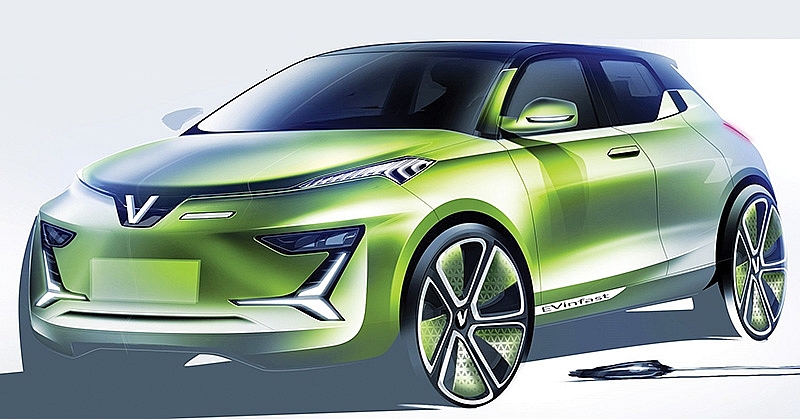Preparing legal framework for the future of electric vehicles
 |
| Recent developments in the electric vehicle sector have shown that personal and commercial transpotation can soon solely rely on electricity |
As electric vehicles are touted as the key to resolving air pollution in sprawling cities, manufacturers are expecting better policies to develop the industry.
Air pollution in Hanoi and Ho Chi Minh City, the two biggest cities in the country, is getting more and more serious. The environmental pollution index in the above cities is much higher than those permitted by local authorities. It is caused by many different sources, but motor vehicles powered by conventional gasoline and diesel engines are the main culprits.
 |
| By Vu Tan Cong - Deputy general director Vietnam Automobile Industry and Trade Consulting Co., Ltd. |
One of solutions to reduce air pollution as proposed by local authorities is to replace internal combustion engine-equipped vehicles, step-by-step, by pure electric vehicles (EVs) including electric city buses, passenger cars, and trucks.
EVs are classed as motor vehicles with powertrains consisting of electric motors. Anything else is considered the same as a conventional motor vehicle.
Plug-in EVs are generally divided into pure-electric or battery EVs that run only on batteries, and plug-in hybrids that combine battery power with internal combustion engines.
The popularity of electric-run vehicles has been expanding rapidly due to government subsidies, their increased range and lower battery costs, and environmental sensitivity.
At present, their mileages hit about 150-500km per charge, while charging times are around 8-10 hours for normal charging and 60-90 minutes for a faster charge. An EV’s top speed is generally 60-150km per hour.
Cheaper than combustion engines
Electricity is less expensive than gasoline and EVs are more efficient than gas vehicles. Electricity prices are also generally much more stable than gas prices. On average, it costs less than half as much to travel the same distance in an EV than a conventional vehicle.
Second, maintenance and repair costs are much lower than conventionally-powered automobiles thanks to the lack of complicated internal combustion engines.
Another advantage is that it is easier for these newer vehicles to become interactive with humans via smartphones, which is much more appealing for people today.
EVs are also very important to smart cities. Electric cars contribute to reducing air pollution in smart cities and to fighting climate change. Moreover, electric cars are easy to integrate with smart parking solutions and electric car-sharing services.
Parking solution systems optimise parking space usage in urban cities in a way that is smart, efficient, and contributes to a better traffic flow.
However, the biggest disadvantage is their higher prices compared to traditional vehicles. This is because of the raw materials used in the battery, as well as the expensive processes involved in battery production.
Today, electric car batteries cost about $176 per kilowatt hour, but that figure will drop to just $87 by 2025, according to analysts at Bloomberg New Energy Finance.
Currently, prices are often up to twice as high than those of conventional vehicles of the same model.
However, thanks to scientific and technological development, it is believed that by 2026, prices of electric-powered vehicles will be almost the same as those of conventional ones. By then, there will be a boom in the global market worldwide, including in Vietnam.
Modern automobile industry
With these advantages, EVs will become more popular around the world. To meet these increasing demands, many world-class automobile giants are manufacturing and making huge investments in the development of electric-run products. By doing so, they are becoming more affordable.
Mercedes-Benz, Audi, and Volkswagen are among the automobile manufacturers from the European Union that are developing with much success worldwide.
Toyota and Mitsubishi, meanwhile, are two massive Japanese EV manufacturers. Additionally, one of the world’s biggest electric vehicle manufacturers is the United States-based Tesla, which is dominating the US market. Among EV brands, Tesla’s currently boasts the longest mileage after one charge.
In consideration of China’s large market, Tesla is constructing a $1.5 billion EV project in Shanghai. The facility will produce battery cells along with Tesla Model 3 and Tesla Model Y cars, at an initial production rate target of 250,000 electric cars annually.
China is the world’s biggest market for such vehicles including passenger cars, buses, and trucks. As a result, there are many EV manufacturers in the country, such as BYD Auto, Geely, Great Wall Motors, and Chery. All of these manufacturers have been placing investment into research and development aimed at reducing production costs by applying advanced technology and optimisation in production processes. It also targets an increase in mileage per charge by increasing battery accumulation, electric motor efficiency, and reducing vehicle weight by using aluminium alloy and plastic materials for body parts.
Vietnam’s EV industry
In consideration of the high demand in Vietnam in the near future, some domestic and international automobile manufacturers have been pushing plans forward.
In early this year, VinFast announced its plan on a manufacturing project in a Haiphong factory with technology transfer from BMW.
In 2017, DiMora Enterprises signed an MoU on a $500 million EV-manufacturing project with Thanh Hoa People’s Committee.
In January 2018, Mitsubishi Motors signed an MoU with the Ministry of Industry and Trade’s Industry Agency on R&D of EVs in Vietnam.
However all of the above projects have yet to become online, and are awaiting market development and government policies on EV industry manufacturing and trade.
With current import tax rates of 18-20 per cent on complete knock-down kits and special consumption tax rates of 15 per cent, the manufacturing of EVs in Vietnam is not yet efficient or feasible.
Like any other industry, EV manufacturing needs the market to develop and at present, the lack of infrastructure and the high costs of EVs is obstructing it.
In order to develop the market, it is necessary for both the central and local governments to study and promulgate incentive and support policies on industry development.
In China, for example, local and central governments are supporting both EV manufacturers and end-buyers with subsidies ranging from $4,500-$9,000 per unit depending on the model and province. Thanks to these subsidies, China manufactured and sold about 1.2 million plug-in EVs last year, which was more than three times the sales in the US. As a result, China has become the fastest- and largest-growing market for EVs in the world.
Proposed policies
In order to develop Vietnam’s industry and the market, some proposals on policies are advisable for both central and local governments to consider.
Import taxes should not be applied to complete knock-down kits, raw materials, and production equipment to be imported for EV manufacturing and assembling.
Special consumption tax on electric-powered vehicles should be scrapped. Also, it should partly or wholly provide support for technology transfer fees, while giving full support to Electricity of Vietnam to develop a charging station network in big and key cities, along with developing smart cities. Furthermore, the local governments should exercise several actions in rates.
First, no land-using fee for 15 years from the project’s ground-breaking should be considered, along with a 50 per cent reduction in land-using fee for the subsequent five years.
Second, a corporate income tax exemption for 10 years after the first vehicle rolls off the production lines, as well as a 50 per cent reduction in the tax for the subsequent decade.
Third, personal income tax exemption for all employees for 10 years from the project’s ground-breaking and 50 per cent tax reduction for the subsequent five years.
Finally, it is necessary to consider a 2 per cent rate for EV passenger car ownership-transferring fee; no fee for EV commercial vehicles such as buses and trucks; and a 50 per cent reduction in EV registration fees.
What the stars mean:
★ Poor ★ ★ Promising ★★★ Good ★★★★ Very good ★★★★★ Exceptional
Related Contents
Latest News
More News
- IP alterations shape asset strategies for local investors (January 22, 2026 | 10:00)
- 14th National Party Congress: Vietnam - positive factor for peace, sustainable development (January 22, 2026 | 09:46)
- Japanese legislator confident in CPV's role in advancing Vietnam’s growth (January 22, 2026 | 09:30)
- 14th National Party Congress: France-based scholar singles out institutional reform as key breakthrough (January 21, 2026 | 09:59)
- 14th National Party Congress: Promoting OV's role in driving sustainable development (January 20, 2026 | 09:31)
- 14th National Party Congress affirms Party’s leadership role, Vietnam’s right to self-determined development (January 20, 2026 | 09:27)
- Direction ahead for low-carbon development finance in Vietnam (January 14, 2026 | 09:58)
- Vietnam opens arms wide to talent with high-tech nous (December 23, 2025 | 09:00)
- Why global standards matter in digital world (December 18, 2025 | 15:42)
- Opportunities reshaped by disciplined capital aspects (December 08, 2025 | 10:05)

 Tag:
Tag:




















 Mobile Version
Mobile Version